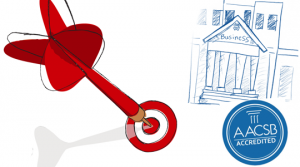
August 16, 2011
By Margaret Cox
In the world of college business schools, earning the most prestigious of accreditations is no small feat; however, it is one that Winona State University can proudly say that it earned with flying colors. Its College of Business recently earned accreditation from the Association to Advance Collegiate Schools of Business International (AACSB), joining the ranks of just 620 institutions, or less than 5-percent worldwide, that have achieved this rigorous goal.
The bull’s-eye for business schools
Established in 1916, AACSB is the oldest, most elite accrediting agency for collegiate schools of business, and is dedicated to quality management education and continuous improvement of business programs. In order to achieve accreditation, an institution must meet 17 standards of excellence that range from admissions procedures to curriculum management to faculty intellectual contributions.
In the 1980s, a group of faculty voted to pursue AACSB accreditation, but it wasn’t until 2006, when competitive pressures from other schools increased dramatically, that WSU formally applied for AACSB accreditation. In 2007, when Dr. Bill Murphy became dean of the College of Business, the 5-year process was already underway, and the faculty, staff, and students began pulling together to reach the targeted goal: to validate the strengths of the College of Business and earn accreditation.
Aiming for success
To ensure that the 17 standards were reviewed, documented, and met, several groups were formed to streamline the process. A Faculty Advisory Committee comprised of the chairs from the five College of Business departments and one representative from each major met on a regular basis to keep the process flowing. A Business Advisory Board and a Student Advisory Board that included the presidents of the seven student organizations with the College of Business also offered input.
“Establishing a comprehensive assessment plan was the most challenging part of the accreditation process,” said Murphy. “The faculty worked on rubrics and reviewed more traditional assessments like testing to ensure that standards were being met or exceeded. We were constantly gathering data and analyzing it. Once the group agreed upon a method, we would test it, and then tweak it some more. This took two or three years alone, but we made excellent progress.”
Although the College of Business already had strong programs, the internal and external reviews resulted in a number of changes, such as the admissions process and core curriculum. “We solicited input from the Faculty, Business, and Student Advisory Boards, and we had the full support of the president of the university,” explained Murphy. “As a result, we were able to develop solid, common courses that would eventually be required by all majors within the College of Business.”
After five years of review, standardization, and documentation, the College of Business was ready for its AACSB Board review. In the final stage of the process, three deans from peer schools traveled visited Winona and provided final commentary. On April 28, the news was official: the WSU College of Business had earned accreditation from AACSB International.
Targeting the future
Achieving AACSB accreditation is by no means the end of the story; rather, it is just the beginning. As an accredited institution, Winona State is poised to recruit the best business students and faculty who are looking for an accredited business school with a smaller student-to-faculty ratio and courses that emphasize learning both inside and outside the classroom.
In addition to a strong internship program that places students in a variety of companies, WSU also has creative faculty members who recognize the importance of experiential learning. “One faculty member teaches a course on social entrepreneurship,” said Murphy. “Students work on projects for non-profit organizations that involve volunteer hours as well.”
More companies are looking for graduates from accredited colleges of business. Locally, Fastenal and WinCraft are just two of the many business partnerships the College of Business has formed over the years.
“These companies have been great about providing internships and hiring our graduates,” said Murphy. “In addition, WSU has the second largest number of graduates at Federated Insurance in Owatonna, with alumni serving in positions such as regional director and vice president.”
The College of Business also enjoys the support of its alumni, who continue to refer new students to the program, contribute to scholarships, and offer wisdom to current students by participating in the Speakers Program, held three times each semester. “Alumni and students are really proud of the AACSB accreditation,” said Murphy.
“One of the greatest thrills for me as a dean is to congratulate our students at their graduation ceremony. The fact that students can now say they are graduates of an AACSB accredited institution makes it that much sweeter.”
By the Numbers…
- Number of Years spent in the AACSB accreditation process: 5
- Number of AACSB standards to be met: 17
- Number of Students in WSU College of Business: 1,283
- Number of dollars invested by student investment group: $100,000
Student Investment Group gets Hands-On Experience
One College of Business program that the AACSB Board was especially pleased to find was a student investment course that offered real-life application of knowledge. Led by Dr. Chan-Wung Kim in the spring semester of 2010, this course provided students with hands-on experience in managing a $100,000 portfolio on behalf of the WSU Foundation.
Students researched and selected companies in which to invest, and were responsible for reporting results to the Foundation Board of Trustees. “It really brought reality into the classroom, because it was not monopoly money,” said Bill Murphy, dean of the college. Students were held to the same standards as professional financial advisors who assist the Foundation, and proved they were up to the task.
“I sat in on their presentations,” said Murphy. “Their results were as good, or in some cases better, than their professional counterparts.”

